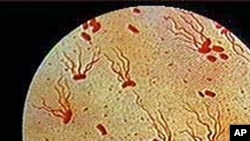Scientists are conducting experiments with mice using salmonella - a bacteria commonly associated with food poisoning - to treat, and in some cases, cure melanoma, the most deadly form of skin cancer. The results have been so promising researchers are looking to conduct human trials.
Researchers at the European Institute of Oncology in Milan, Italy, injected salmonella directly into the tumors of mice that were bred to grow melanoma lesions on their skin.
Maria Reschigno, director of the Institute's Division of Immunotherapy, says the bacterium stimulated an immune response by causing the formation of channels inside the tumor called gap junctions. She led led the research team and says protein fragments from the tumors - called peptides - escaped through these channels where they were detected by dendritic cells, which are roving guardians of the immune system. They then become fingerprinted with the information, initiating a potent immune-system attack against the cancer.
Researchers conducted two sets of experiments. In one set, Reschigno said they injected salmonella-treated cells into mice without melanoma and then tried to get the animals to form tumors.
"And this immune response would protect the mice against the formation [or] induction, of tumors," said Reschigno. "And this was in a preventive setting; so when the mice did not have the tumors. And this was one hundred percent of protection."
Researchers then injected the treated dendritic cells into mice with tumors. "When we were using the dendritic cells for therapeutic purpose[s], then we would see the slowing down of the growth of established tumors," said Reschigno. She also said the tumors completely resolved in 50 percent of the experimental animals.
Melanoma is the deadliest form of skin cancer, primarily afflicting light-skinned individuals. Over-exposure to the sun is a leading risk factor and, in its earliest form, Reschigno says the disease is curable with surgery to remove the tumor.
Once the cancer has metastasized, though, spreading and seeding to other sites throughout the body, Reschigno said there is no cure.
However, she said her animal experiments suggest that researchers could develop an effective therapy for metastatic melanoma using cancer cells that have been treated with salmonella.
"We were seeing that we had an immune response not only to the tumor that was infected with salmonella, but also to the one that was at a distant site that was not infected," said Reschigno.
Additionally, Reschigno said preclinical human studies are promising, showing that salmonella injected into human melanoma tumor cells produces the same channel formation.
Researchers hope to secure regulatory approval to begin human clinical trials by the middle of next year.
An article by researchers describing how salmonella bacterium kills cancer is published this week in the journal Science Translational Medicine.




